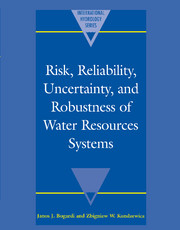Book contents
- Frontmatter
- Contents
- List of Contributors
- 1 Introduction
- 2 Integrated regional risk assessment and safety management: Challenge from Agenda 21
- 3 Risk analysis: The unbearable cleverness of bluffing
- 4 Aspects of uncertainty, reliability, and risk in flood forecasting systems incorporating weather radar
- 5 Probabilistic hydrometeorological forecasting
- 6 Flood risk management: Risk cartography for objective negotiations
- 7 Responses to the variability and increasing uncertainty of climate in Australia
- 8 Developing an indicator of a community's disaster risk awareness
- 9 Determination of capture zones of wells by Monte Carlo simulation
- 10 Controlling three levels of uncertainties for ecological risk models
- 11 Stochastic precipitation-runoff modeling for water yield from a semi-arid forested watershed
- 12 Regional assessment of the impact of climate change on the yield of water supply systems
- 13 Hydrological risk under nonstationary conditions changing hydroclimatological input
- 14 Fuzzy compromise approach to water resources systems planning under uncertainty
- 15 System and component uncertainties in water resources
- 16 Managing water quality under uncertainty: Application of a new stochastic branch and bound method
- 17 Uncertainty in risk analysis of water resources systems under climate change
- 18 Risk and reliability in water resources management: Theory and practice
- 19 Quantifying system sustainability using multiple risk criteria
- 20 Irreversibility and sustainability in water resources systems
- 21 Future of reservoirs and their management criteria
- 22 Performance criteria for multiunit reservoir operation and water allocation problems
- 23 Risk management for hydraulic systems under hydrological loads
3 - Risk analysis: The unbearable cleverness of bluffing
Published online by Cambridge University Press: 18 January 2010
- Frontmatter
- Contents
- List of Contributors
- 1 Introduction
- 2 Integrated regional risk assessment and safety management: Challenge from Agenda 21
- 3 Risk analysis: The unbearable cleverness of bluffing
- 4 Aspects of uncertainty, reliability, and risk in flood forecasting systems incorporating weather radar
- 5 Probabilistic hydrometeorological forecasting
- 6 Flood risk management: Risk cartography for objective negotiations
- 7 Responses to the variability and increasing uncertainty of climate in Australia
- 8 Developing an indicator of a community's disaster risk awareness
- 9 Determination of capture zones of wells by Monte Carlo simulation
- 10 Controlling three levels of uncertainties for ecological risk models
- 11 Stochastic precipitation-runoff modeling for water yield from a semi-arid forested watershed
- 12 Regional assessment of the impact of climate change on the yield of water supply systems
- 13 Hydrological risk under nonstationary conditions changing hydroclimatological input
- 14 Fuzzy compromise approach to water resources systems planning under uncertainty
- 15 System and component uncertainties in water resources
- 16 Managing water quality under uncertainty: Application of a new stochastic branch and bound method
- 17 Uncertainty in risk analysis of water resources systems under climate change
- 18 Risk and reliability in water resources management: Theory and practice
- 19 Quantifying system sustainability using multiple risk criteria
- 20 Irreversibility and sustainability in water resources systems
- 21 Future of reservoirs and their management criteria
- 22 Performance criteria for multiunit reservoir operation and water allocation problems
- 23 Risk management for hydraulic systems under hydrological loads
Summary
ABSTRACT
A critical contemplation is offered of what is known and what is not known about the hydrological, economic, and societal uncertainties that are eagerly and routinely subjected to all kinds of mathematical prestidigitation in the process of risk analysis of water resources systems. An illustration of the issues is provided by a reality check on some real-life situations, mostly based on the author's own experience from the past forty years. Three simple recommendations are offered that may bring risk analysis down to earth.
INTRODUCTION
Spurred by the newly available computing technology, the influx of mathematical statistics and probability theory into the analysis of uncertainty in hydrology and water resources in the 1960s was powerful and unprecedented. Also unprecedented has been its side effect – an outburst of “applications” of various spurious theories suddenly made so easy by the computer. By the mid-1970s the danger of this malignant growth was already evident and solitary warning voices could be heard. One of the clearest and most passionate was that of the late Myron Fiering of Harvard University: “Fascination with automatic computation has encouraged a new set of mathematical formalisms simply because they now can be computed; we have not often enough asked ourselves whether they ought to be computed or whether they make any difference … we build models to serve models to serve models to serve models, and with all the computation, accumulated truncation, roundoff, sloppy thinking, and sources of intellectual slippage, there is some question as to how reliable are the final results” (Fiering 1976).
- Type
- Chapter
- Information
- Publisher: Cambridge University PressPrint publication year: 2002
- 3
- Cited by



